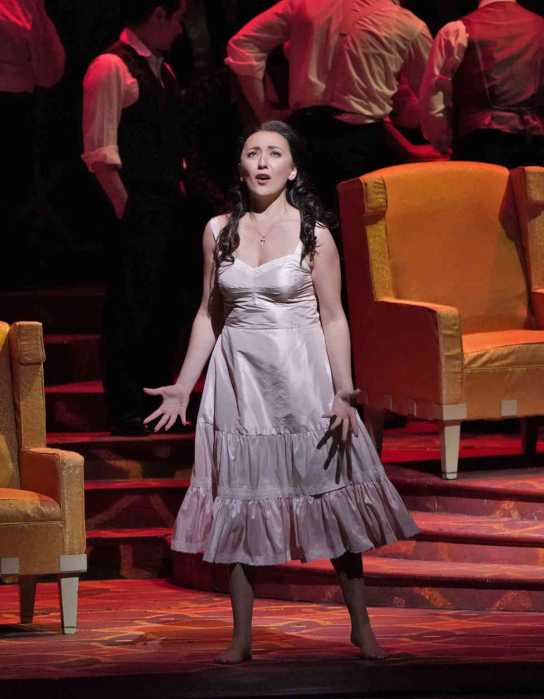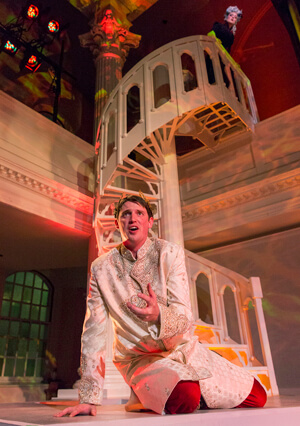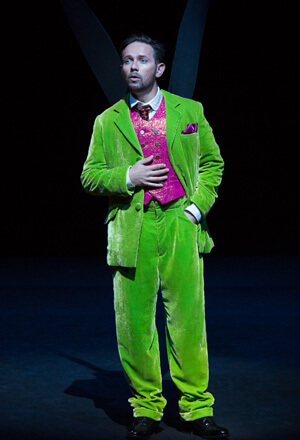Surely the best Mozart revival of the season was the uniformly well-cast “La clemenza di Tito” (seen April 11). The 1984 production, directed and designed by the late Jean-Pierre Ponnelle in neo-Classical style (Giambattista Piranesi a central referent visually), holds up well for what it is — not to all tastes, especially not the drab male choral costumes, but apt for the opera seria style and intertextually linked to Ponnelle’s earlier “Idomeneo.” Most writers seem to have forgotten that both of these now frequently encountered Mozart works had been staged at City Opera a few years before the Met took them up; but the Ponnelle stagings marked a beachhead in their acceptance by American audiences.
Though he couldn’t negate the camp effects of Vitellia’s aircraft-carrier panniered dress, revival director Peter McClintock made the action vivid, helped by the considerable dramatic talents and insights of his two leads, Matthew Polenzani (Tito) and Joyce DiDonato (Sesto). These two exemplary artists, frequent colleagues, offered these roles to Chicago audiences in 2014, but their portrayals here had deepened and remained astoundingly detailed and affecting musically. Both dealt in beautifully layered dynamics and showed acute weighing of texts, decoration, and musical phrasing. DiDonato’s slight but thrilling pause before the second “Guardami” as Sesto beseeched Vitellia in “Parto, parto” made my jaw drop. Polenzani and DiDonato gave us world-class performances.
Ying Fang’s Servilia looked and sounded enchanting, needing only more attention to consonants in her cantilena music to achieve perfection. Emily D’Angelo, a very young and gifted Canadian mezzo, played Annio ardently, with bright, pleasing tone; with more experience, she may well attain the distinction in phrasing her senior colleagues showed. Christian Van Horn made Publio livelier than usual and sang “Tardi s’avvedi” very well; sometimes his tonal center drifted in ensembles. As Vitellia, Elza van den Heever entered wholeheartedly into Ponnelle’s amusing but distinctly misogynistic “Joan Collins” concept; her large soprano sounded healthy, but in this august company her runs and turns lacked precision.
Lothar Koenigs led capably, rising to eloquence in Act Two. Special kudos are due Inn-Hyuck Cho, the clarinet and basset horn soloist.
The Met’s “Die Walkuere” (April 25) proved a highly enjoyable performance, well cast and largely well acted despite the often silly and pointless stage effects — those amateurish shadow videos during the narrations! — of Robert Lepage’s production and Carl Fillion’s set. Revival directors Gina Lapinski and J. Knighten Smit crafted more interactive Personenregie among the characters than Lepage bothered to evoke in 2011, but still we’re left with inanities like Hunding’s Fabio-haired posse grabbing focus when Wotan’s anguish should dominate at he end of Act Two
Philippe Jordan led a brisk account, marred only occasionally by brass flubs, and perhaps exciting rather than particularly penetrating. Only the Todesverkuendigung scene and the final father/ daughter colloquy really scored emotionally, partly because — for all her impassioned acting — Eva-Maria Westbroek’s Sieglinde was marred by consistently shrill tone up top. Anything G or above found her splaying her arms semaphorically and hoping for the best. The exultant “O herstes Wunder” thus went for little. Less nimble and seductive visually than Jonas Kaufmann at this staging’s premiere, Stuart Skelton gave a highly creditable Siegmund vocally, singing with clarity and increasing dynamic nuance. It’s not the most ravishing timbre — and Jordan should have reined him in on the endlessly held cries of “Waelse!” — but he performed with considerable art and ardor.
I was happy finally to see Christine Goerke’s committed, engaging Bruennhilde, though her consistent onstage honesty made the warrior maid almost too human too fast. But she took the audience on a genuine emotional journey. The top has a new lightness and ease that reminded me of my first-ever “Walkuere” Bruennhilde, Rita Hunter; and as ever Goerke scored strongly whenever chest tone was needed. Though he tripped early on scrambling up the awkward set, the fit Greer Grimsley roamed around so much as Wotan that he projected less than ideal Godhood. His bass-baritone, pleasingly free up top though not voluminous when the orchestral forces soar, has a kind of testosterone-fueled darkness that can get monotonous, but he’s developed considerably more verbal and dynamic nuance in the last few seasons.
Jumping in for the ill Jamie Barton as Fricka, Michaela Schuster brought her wealth of experience in character projection to bear, relishing every phrase, every syllable. Sometimes trenchant, sometimes yielding vocally, she made a striking impact. As Hunding, the dynamic bass Guenther Groissboeck boomed out loud and clear and bit into his text with vitriol; he reacted to others’ text just as individually. One wished Hunding had more to sing. The Valkyries — loudly cheered for the calisthenic visuals by a none too musical audience — sang generously, led strongly by Kelly Cae Hogan’s Gerhilde and Jessica Faselt’s Helmwige.
On April 12, Manhattan School of Music’s consistently pleasing Senior Opera Theater presented a talented undergraduate cast in Benjamin Britten’s comedy “Albert Herring” — not at all an easy piece to pull off, but director Dona D. Vaughan and her design and diction team made it handsome, consistent, and very droll in style. Some saggy opening night string tone aside, Jorge Parodi’s orchestra also delivered.
Though based on a Maupassant story, “Herring” has a veddy British plot and text, rather like an Ealing comedy. There’s a gay subtext of a constrained young man breaking out into long repressed sensual maturity. The staging neither stressed nor minimized this element. At 1947’s premiere, the two leading roles went to queer artists: Britten’s life partner and tenor muse Peter Pears (Albert) and the soprano Joan Cross (Lady Billows). Both had taken part in creating “Peter Grimes” and “The Rape of Lucretia” and would go on to “Gloriana” and “The Turn of the Screw”.
Most in the cast showed clear potential — and achievement. Joseph Tancredi entered bodily into Albert’s plight, showing remarkable diction and an excellent, pliable tenor. Some of the singers playing the community’s older characters bore the too-evident burden of youth, but fared well anyway. Riley Bragg coped with Lady Billows’ challenging tessitura with alacrity. As Miss Pike, her “companion,” Gabriella Chea displayed a remarkably potent mezzo and a fine comic sense. Yvette Keong sang Miss Wordsworth’s challenging music — created by superb soprano Jennifer Vyvyan — delightfully. Sung Shin made an admirable Vicar Gedge and Adam Goldstein a charming, deft Upfold. With Christina Parsons (Nancy), Edward Lim (Superintendent Budd), and Erin Wagner (Mrs. Herring, a character Eric Crozier’s libretto treats rather unfairly), one felt that further seasoning will enhance and solidify their manifest talents. A highly enjoyable evening.
David Shengold (shengold@yahoo.com) writes about opera for many venues.




































